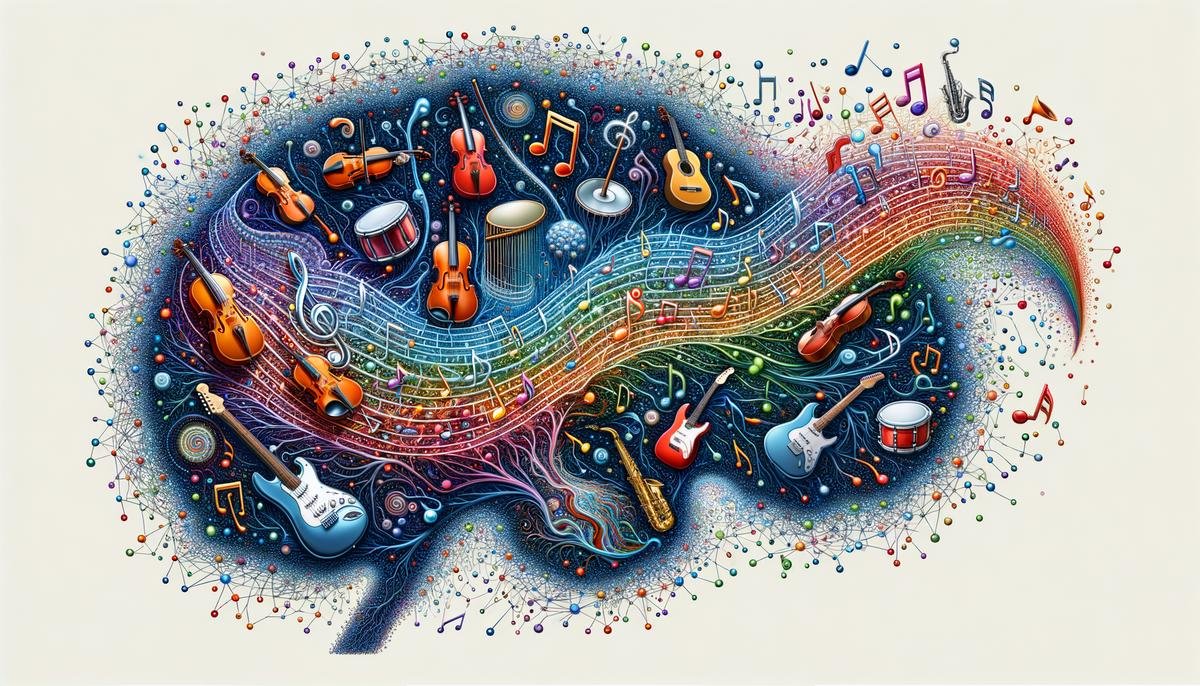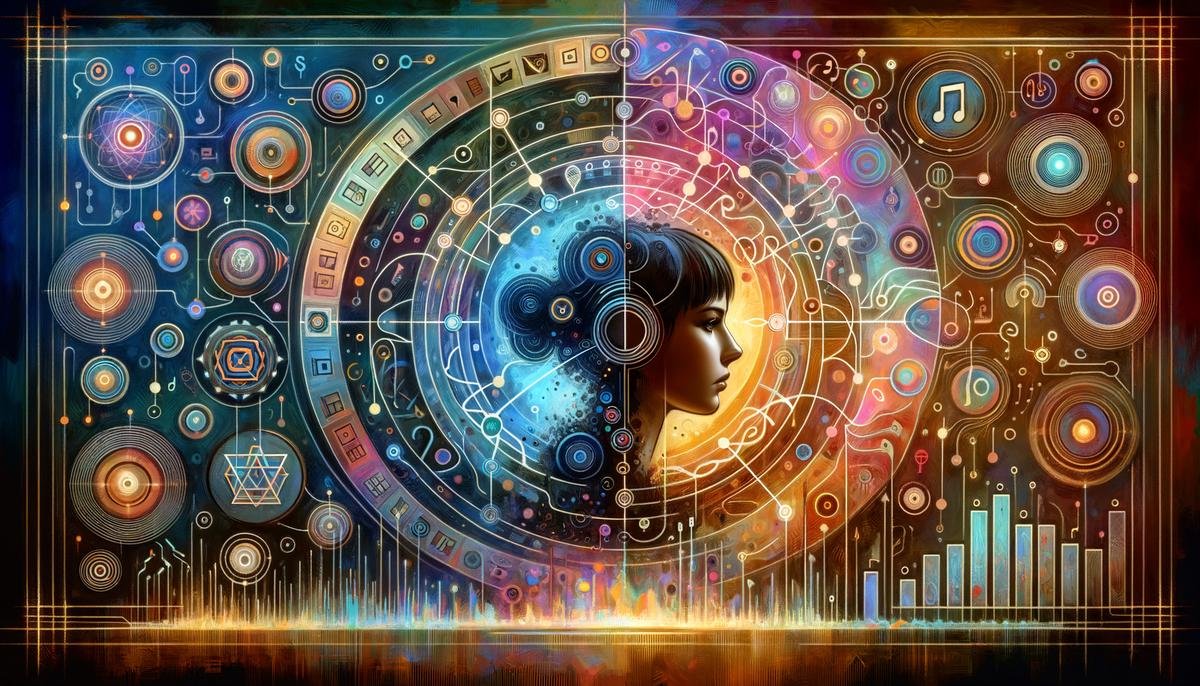Overview of AIVA’s Technology
AIVA (Artificial Intelligence Virtual Artist) uses AI to compose music across various genres. Founded in 2016 by Pierre Barreau and his team, AIVA aims to create personalized soundtracks for movies, games, commercials, and more.
AIVA employs deep learning algorithms, primarily recurrent neural networks (RNNs) and convolutional neural networks (CNNs), to analyze thousands of musical scores and generate original compositions. RNNs predict the next notes in a sequence, while CNNs analyze pitches, durations, and other musical elements to create coherent pieces.
The creation process begins with user preferences input, such as genre, mood, or tempo. AIVA then generates music based on these inputs, iteratively applying modifications to produce unique compositions. To ensure variety, the system adjusts harmony, melody, and rhythm through several iterations.
AIVA’s technology is accessible through a user-friendly interface, allowing even those without musical training to generate professional-quality music. Users can edit and refine these compositions using an integrated digital audio workstation (DAW) on AIVA’s platform.1

Music Creation Methods
AIVA offers two primary methods for music creation:
- Pre-trained preset styles: Built from a vast repository of historical musical data, encompassing various genres, moods, and epochs. Users select parameters like genre, mood, and tempo, and AIVA’s algorithms generate music conforming to the chosen style.
- User-uploaded influences: Allows for more customization. Users can upload their own MIDI or audio files as templates. AIVA analyzes these files, extracting musical features to create a new composition inspired by the uploaded material without directly replicating it.
Both methods rely on AIVA’s neural network capabilities to ensure coherence and originality. Users can further refine these compositions through AIVA’s integrated digital audio workstation (DAW), adding effects, adjusting dynamics, and fine-tuning the composition.

Applications and Use Cases
AIVA’s music has found numerous practical applications across diverse domains:
- Film scores: Helps filmmakers create captivating and emotionally resonant scores efficiently, particularly beneficial for independent projects with budget constraints.
- Video games: Generates dynamic soundtracks that adapt to various in-game scenarios, enhancing player immersion.
- Commercials and advertisements: Used to create catchy jingles or emotional tracks suited to campaigns, with the ability to rapidly generate diverse musical variations.
- Social media content: Creators on platforms like YouTube, TikTok, and Instagram can generate custom soundtracks that match their content’s style and tone.
- Music industry: Composers and producers use AIVA as a source of inspiration and to overcome creative blocks.
- Education: Educational institutions can leverage AIVA to teach music theory and composition interactively.
Challenges and Controversies
AIVA and similar AI-generated music technologies face several challenges and controversies:
| Challenge | Description |
|---|---|
| Copyright issues | Questions about ownership rights for AI-generated music. AIVA’s dual structure addresses some concerns but doesn’t eliminate confusion entirely. |
| Emotional depth | Critics argue that AI-generated music lacks the emotional nuance and soul typically embedded in human-composed music. |
| Impact on human musicians | Concerns about AI potentially displacing human composers, particularly in entry-level or high-volume content creation scenarios. |
| Public and industry reactions | Mixed reactions, with some embracing the innovation and others viewing AI with skepticism. |
| Ethical considerations | Questions about whether AI-generated art dilutes the value of human creativity and the potential for misuse in replicating specific artists’ styles without consent. |
Addressing these challenges requires clear regulatory frameworks, industry transparency, and ongoing dialogue between technologists, artists, legal authorities, and the public to shape a future where AI and human creativity can coexist.2
Future Prospects and Innovations
The future of AI in music composition offers potential for advancements. AIVA, an already capable platform, can see improvements to its abilities, creating new opportunities for creativity and productivity in the music industry. As computational power and machine learning algorithms progress, AIVA and similar AI technologies are set to become more sophisticated.
Potential advancements include:
- Improved emotional intelligence: Future versions could incorporate models that better simulate human emotional expression, enabling music with richer emotional resonance.
- Real-time collaboration features: AIVA could support interactive sessions where human musicians and AI compose together instantly, fostering a more dynamic creative process.
- Expanded genre and style capabilities: Future updates could include more niche and experimental genres, catering to a broader spectrum of musical tastes.
- Adaptive learning: AIVA could implement algorithms that evolve based on user interaction, offering increasingly personalized music creation experiences.
The broader implications for the music industry are significant. AI technology in music composition could democratize access to professional-level music creation tools, empowering more people to compose high-quality music. This could lead to a surge in new musical content, fostering greater diversity in the industry.
AI could also transform music education, with institutions integrating AI composers into their curricula to provide interactive learning experiences.
In the professional domain, AI can serve as a companion to human artists, handling repetitive tasks and freeing up composers to focus on more inventive aspects of music creation.
Advancements in quantum computing could increase the computational capabilities available to AI composers, while ongoing dialogue on AI ethics will be essential to maintain a balance between technological innovation and artistic integrity.1
In summary, the future of AI in music composition holds possibilities for making music creation more accessible, efficient, and innovative, potentially enriching the global musical landscape.

As AI continues to integrate into various aspects of our lives, AIVA stands out as a tool that bridges technology and creativity in music composition. Its potential to complement human artistry while providing efficient solutions marks a step forward in the music industry.




